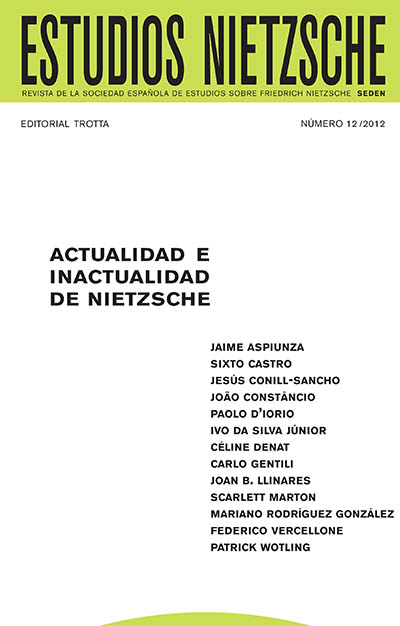Nietzsche: ¿político o apolítico?
DOI:
https://doi.org/10.24310/EstudiosNIETen.vi12.10558Palabras clave:
gran política, voluntad de poder, aristocracia, moralResumen
Aunque en Nietzsche no hay una doctrina política en sentido estricto, su pensamiento tiene sin duda una dimensión política. Desde la segunda Consideración intempestiva sobre la historia, Nietzsche se muestra interesado en tomar distancia frente a la situación de su tiempo. Además, en el mismo concepto de «voluntad de poder», sociedad, ética, mundo físico y político están estrechamente conectados. El concepto de «gran política» tiene un papel central, aunque tenga primariamente una connotación moral. En general, podemos decir que el sentido político de la filosofía de Nietzsche deriva siempre de sus ideas morales. Considera que su destino personal se corresponde con el destino de Europa. En sus últimas obras trabaja con el concepto de «aristocrático», que tiene que ser entendido como una aristocracia del espíritu, en vez de social o política.
Descargas
Métricas
Citas
Ansell-Pearson, K., An Introduction to Nietzsche as Political Thinker. The Perfect Nihilist, Cambridge: Cambridge UP, 1994.
Aschheim, S. E., The Nietzsche Legacy in Germany 1890-1990, Berkeley/Los Angeles/London: University of California Press, 1992.
Burckhardt, J., Die Kultur der Renaissance in Italien. Ein Versuch, en Gesammelte Werke, vol. III, Basel: Schwabe, 1955.
Colli, G., Dopo Nietzsche, Milano: Adelphi, 1974.
Escobar, R., Nietzsche e la filosofia politica del XIX secolo, Milano: il Formichiere, 1978.
Gentili, C., Nietzsche, Madrid: Biblioteca Nueva, 2004.
Gerhardt, V., Pathos und Distanz. Studien zur Philosophie Friedrich Nietzsches, Stuttgart: Reclam, 1988.
Heidegger, M., Nietzsche, Pfullingen: Neske, 1961 .
Losurdo, D., Nietzsche, il ribelle aristocratico. Biografia intellettuale e bilancio critico, Torino: Bollati Boringhieri, 2002.
Lowith, I., Jacob Burckhardt. Der Mensch inmitten der Geschichte, en Samtliche Schriften, vol. 7, Stuttgart: Metzler, 1984.
Mann, Th., Betrachtungen eines Unpolitischen, Frankfurt a.M.: Fischer, 1983.
Müller-Lauter, W., Nietzsche-Interpretationen I. Über Werden und Wille zur Macht, Berlin-New York: de Gruyter, 1999.
Nietzsche, F., Obras Completas, I-IV (OC ). Director ed. Diego Sánchez Meca. Madrid: Tecnos, 2011-2016
Nietzsche, F., Correspondencia I-VI. (CO). Director ed. Luis E. de Santiago Guervós. Madrid : Trotta, 2005- 2012.
Nietzsche, F., Fragmentos Póstumos I-IV (FP). Director ed. Diego Sánchez Meca. Madrid: Tecnos, 2006-2010.
Ottmann, H., Philosophie und Politik bei Nietzsche, Berlin/New York: de Gruyter, 21999.
Rehmann, J., Postmoderner Links- Nietzscheanismus. Deleuze & Foucault. Eine Dekonstruktion, Bonn: Argument, 2004.
Shaw, T., Nietzsche's Political Skepticism, Princeton/Oxford: Princeton UP, 2007.
Siemens, H. W., y V Roodt (eds.), Nietzsche. Power and Politics, Berlin/New York: de Gruyter, 2008.
Vaihinger, H., Nietzsche als Philosoph, Berlin: Reuther & Reichard, 1902.
Descargas
Publicado
Cómo citar
Número
Sección
Licencia
A partir del número 21 (2021) esta revista se publica únicamente en acceso abierto (ruta diamante).
Desde ese número 21, como los números anteriores publicados en ESTUDIOS NIETZSCHE, están sujetos a la licencia Creative Commons Reconocimento-NoComercia-Compartirigual 4.0 cuyo texto completo puede consultar en <http://creativecommons.org/licenses/by-nc-sa/4.0>
Es responsabilidad de los autores/as obtener los permisos necesarios de las imágenes que están sujetas a derechos de autor.
Esta obra está bajo licencia internacional Creative Commons Reconocimiento-NoComercial-CompartirIgual 4.0.
Los derechos de autoría son de dos tipos: morales y patrimoniales, los cuales Estudios de Nietzsche reconoce y respeta. Los derechos morales son los relacionados con el reconocimiento de autoría. Son prerrogativas perpetuas, irrenunciables, intransferibles, inalienables, inembargables e imprescriptibles como consecuencia del vínculo indivisible del autor/a y su obra.
Los derechos patrimoniales son aquellos que se derivan de la reproducción, distribución, adaptación o comunicación pública de la obra, entre otros. Estos derechos patrimoniales son cedidos por Estudiso de Nietzsche a la Universidad de Málaga en acceso abierto.
Los autores/as cuyas contribuciones sean aceptadas para su publicación en esta revista conservarán el derecho no exclusivo de utilizar sus
contribuciones con fines académicos, de investigación y educativos,
incluyendo el auto-archivo o depósito en repositorios de acceso abierto de cualquier tipo.
La edición electrónica de esta revista esta editada por la Editorial de la
Universidad de Málaga (UmaEditorial), siendo necesario citar la procedencia en cualquier reproducción parcial o total.







11.png)
